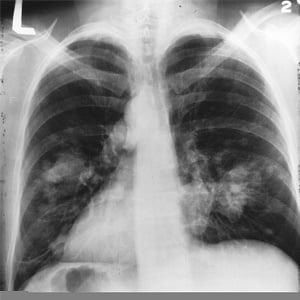
In a head-to-head clinical trial comparing standard chemotherapy with the immunotherapy drug
Results of the trial, reported in the May 31 2015 issue of the New England Journal of Medicine and presented at the American Society for Clinical Oncology 2015 annual meeting, also showed that after a year, the nivolumab group had nearly double the survival rate (42 percent) of the chemotherapy patients (24 percent).
"This solidifies immunotherapy as a treatment option in lung cancer," says Julie Brahmer, M.D., director of the Thoracic Oncology Program at the Johns Hopkins Kimmel Cancer Center.
"In the 20 years that I've been in practice, I consider this a major milestone," she adds, noting that the trial results helped achieve U.S. Food and Drug Administration approval in March to treat such patients whose lung cancer progressed, despite standard chemotherapy.
Read: Scientist
Brahmer emphasizes that the relatively small increase in median survival time with the use of the new immunotherapy drugs may be somewhat misleading in terms of overall impact of the medicines.
"Patients who respond to immunotherapy tend to continue their responses for long durations, and these lengthier responses are cut off in calculations of median overall survival," she says. She suggests that one- and two-year survival data may provide more information about the effectiveness of these drugs than overall median survival rates.
Promising results of an earlier, initial, multicenter clinical trial of nivolumab, first reported in 2013 and directed by Brahmer, led to the current phase III trial of 260 patients treated at hospitals across the world.
Nivolumab is one of a group of so-called "checkpoint inhibitors" that work by disrupting a signaling system used by cancers to avoid detection and destruction by immune cells.
Read: Immunotherapy is not only useful in skin cancer
The handshake between immune cells and
The system, says Brahmer, provides a kind of "handshake" or connection between receptors on immune cells, called PD-1, and their sister-proteins on tumor cells, called PD-L1. Checkpoint inhibitors block that handshake, which alerts immune cells to cancer cells and target them for destruction.
For the new trial, hospitals enrolled patients with advanced, squamous non-small cell lung cancer whose disease had progressed despite initial chemotherapy. Researchers randomly selected 135 patients to receive nivolumab, sold under the name Opdivo, and 137 others to receive the chemotherapy drug docetaxel. Both drugs are delivered intravenously.
Median overall survival of patients receiving nivolumab was 9.2 months, compared with six months for patients who received docetaxel. At one year, 57 patients (42 percent) taking nivolumab were alive, compared with 33 patients (24 percent) taking docetaxel.
Approximately 27 patients (20 percent) receiving nivolumab responded to the drug, compared with 12 (8.8 percent) who took docetaxel. The median disease-progression free survival was 3.5 months for those who took nivolumab and 2.8 months for docetaxel.
The researchers also reported that nivolumab reduced the relative risk of dying from lung cancer by 41 percent in those who took the immunotherapy drug, compared with those who took docetaxel.
Furthermore, they said the most severe side effects occurred more often in patients taking docetaxel (55 percent) than those taking
Those taking docetaxel experienced hair loss, fatigue, nausea, diarrhea and low white blood cell counts, which decreases patients' ability to fight infections. "Immunotherapy can produce severe side effects, and it's important to be vigilant in efforts to manage them. However, it is less toxic than chemotherapy," says Brahmer.
She adds, "Generally, about 20 to 25 percent of patients with lung cancer are responding to checkpoint blockade inhibitors."
Because immunotherapy drugs tend to be expensive, costing more than $100,000 (over R1.2 mil) per year, per patient, Brahmer says there is even more urgency now to find out which patients are more likely to benefit.
This includes determining whether the drugs should be used earlier on in cancer treatment, finding biomarkers to predict response, and combining immunotherapy with other treatments.
Sources: JAMA Oncology Network
Read more:




 Publications
Publications
 Partners
Partners














